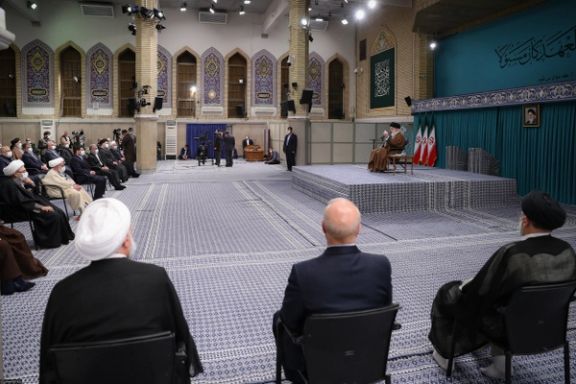Multiple Challenges Show Disarray In Iranian Media, Politics

Chaos and confusion are noticeable in Iran’s government-controlled media and among politicians in recent days, as multiple crises have converged to present unprecedented challenges.

Chaos and confusion are noticeable in Iran’s government-controlled media and among politicians in recent days, as multiple crises have converged to present unprecedented challenges.
One major factor is the Iranian government's haphazard implementation of a policy eliminating food subsidies in a bid to deal with a 50-percent budget deficit. The population pressed by years of hardship took the measure as the ultimate insult and government inability to run the country.
Protests that followed a sudden jump in food prices were dealt with using force, further alienating many people. The last incident portraying the government as corrupt and inept was the collapse of a high-rise building in Abadan that was built by a well-connected insider who ignored construction regulations and mysteriously disappeared after the incident.
Wednesday evening hundreds of Abadan resident came into streets to mourn the victims of the incident but soon began chanting anti-government slogans.
Mehr news agency, which belongs to the Islamic Propagation Organization, a seminary-affiliated office under Supreme Leader Ali Khamenei's direct supervision, pulled a controversial commentary on Thursday, May 26, that said eliminating subsidies, rising prices and "the dissemination of news about widespread corruption even among the Leader's inner circle" have prompted even family members of military and security forces to stand against the government.
Mehr pulled the story after several social media users including prominent journalists such as Reza Haghighatnejad wrote about it in a series of tweets. For a few hours, although the story was pulled, readers could still find it by using search engines and keywords from social media posts. But finally, Mehr, changed the story in a way that all links to the commentary directed readers to an irrelevant story about the availability of wheat.
The commentary said that "the poorly planned and hastily implemented policy of changing the subsidy system has even brought the miliary and police forces among the ranks of dissidents."
The commentary added that "The pilot plan for distribution of subsidized bread has failed because of lack of preparedness and technical capability on the part of the government." The commentary added that "This comes while, the subsidy, which was allocated to bakers has not reached them. At the same time, some officials are demanding that the decision should be reversed."
Mehr added that "Initial estimates indicated the new policy might lead to a 20-60 percent rise in bread prices, but in practice, the price of bread and other goods rose four to six-fold. Some items are even being sold at ten times of their previous price."
The commentary concluded that as a result of the rise in dissent, the regime is getting closer to the abyss on a daily basis." The commentary further suggested that those who have been ruling for more than thirty years should leave the government to others.”
In the Iranian political jargon, any reference to 40 years means from the start of the Islamic revolution in 1979, but references to 30 years, indicate that the author is talking about Khamenei's role as Supreme leader. So, the commentary could be taken as opposition to Khamenei's rule in the circle of Seminarians.
Later on Thursday, Mehr finally acknowledged that the story was on its website and was pulled later, because its website was “hacked by counter-revolutionaries.”